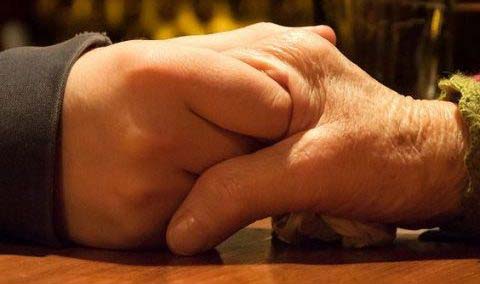Caring for Aging Parents During the Holiday Season

Caring for aging parents is a matter of deep concern, stress and anxiety to many people; those concerns are often intensified at the Holidays.

Are you a caregiver for aging parents? It’s a complex task, that can often seem lonely and thankless. Because of the emphasis on family at the Holidays, and everyone’s heightened expectations, the task of caring for aging parents can feel even heavier at this time of year.
Not a “How To” Article
This isn’t a “how-to” article about looking after aging parents. It focuses on individual caregivers, and how they might best take care of themselves emotionally. How can adult children respond to aging parents? Is there a way to offer care to aging parents, while still “hanging onto ourselves”, our own needs and life goals?
Caring for Aging Parents: Unprecedented Demands on Their Children
Aging parents are living longer, and imposing formidable demands on children. Parents have increased lifespan, but also increased levels of disability, illness and cognitive impairment. Adult children can feel overwhelmed by such situations, when simultaneously helping their own children to “launch”, and dealing with issues of midlife transition and the second half of life.
Guilt
A common response to all these demands is guilt. This takes several forms, as Prof. Satow of Brooklyn College reminds us.
We can feel guilty for not doing what we “should” for parents. Often this means not doing what someone else thinks we should for a parent.
Or we can have what Satow calls separation guilt. This is guilt caused by physical separation, as a result of moving or living away from parents.
Another source of guilt stems from parental envy. The child is younger, perhaps in better health, and perhaps more affluent or less encumbered. The parent may wish it was otherwise, and the child may experience that as a source of guilt.
Even more significant is guilt resulting from ambivalent feelings toward the parent. This can stem from a parent who never connected with us, or from experiences of wholesale abuse and neglect. You might think that this affects a relatively small number of people. The experience of /a-midlife-transitions suggests otherwise.
A final issue that must be taken seriously is the case where we might feel guilty around parents, as a result of a sense of having violated our own moral values around treatment of parents. This is very significant when it occurs, but as we can see, a whole range of other kinds of guilt can masquerade as this one!
You Cannot Save an Aging Parent from Aging
Aging and the decline and breakdown of the body are inevitable parts of the human experience. We might wonder whether our difficulty with accepting the aging of the parent doesn’t sometimes originate in our own difficulty accepting aging in ourselves.
All human life is an aging process culminating in death. We have to accept the reality of the human condition, and simultaneously the need to become ourselves and make meaning in our lives. This is a task that our parents face, and it’s the task that we ourselves face.
The Necessary Courage to Follow Your Own Path
From the perspective of Jungian /a-midlife-transition, we must balance the obligation to parents with the real and genuine call of the self. We need to have the courage to follow our own path, not losing sight of ourselves, and of the necessity to live out who we really are, as we face the challenges of caring for aging parents.

Finding the Center of Your Own Labyrinth
Identifying Your Authentic Role
Care of parents and connection with them must be balanced with our sense of vocation and authentic life. Often, it involves a process of a balancing of doing the “decent” thing with the call of the individual’s own life to be lived and the demands of being who we were intended to be in our lives. Sorting through these demands is not an easy task, and may require us to face our own guilt, fear and anger.
Often, the process of /a-midlife-transition enables the individual to clarify their personal issues around caring for aging parents, and to find a way forward that honours as much as possible both our moral commitments, and the call of the Self.
Brian Collinson, Registered Psychotherapist & Jungian Psychoanalyst
[cta]
